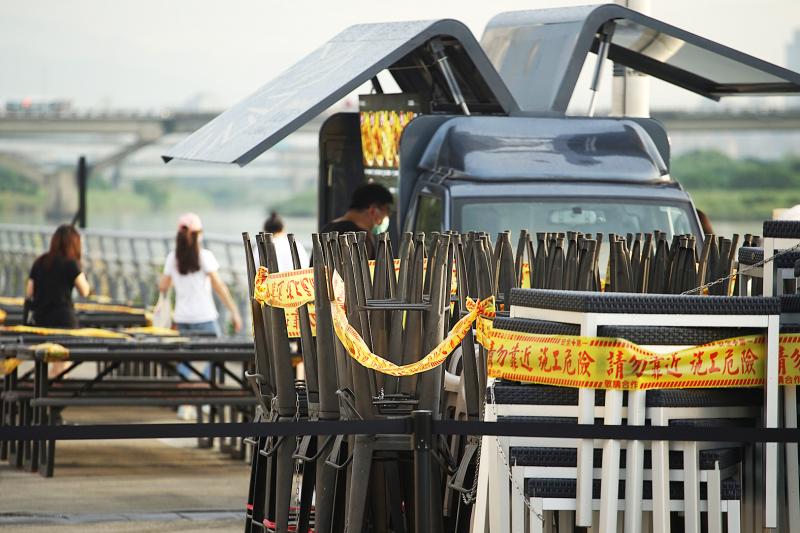Taiwan’s economy last quarter expanded 7.47 percent from a year earlier, 0.54 percentage points faster than last month’s official forecast, thanks to stronger-than-expected exports, the Directorate-General of Budget, Accounting and Statistics (DGBAS) said yesterday.
“The domestic COVID-19 outbreak wreaked havoc with service-oriented sectors, but did not affect the manufacturing industry, which continued to benefit from the stay-at-home economy and gradual reopenings in the US and Europe,” Wu Pei-shuan (吳佩璇), an official at the agency’s national income section, told an online news conference.
Exports surged 37.35 percent year-on-year from April to June on the back of robust demand for electronics used in smartphones, laptops, TVs and vehicles, as well as artificial intelligence and Internet-of-Things applications.

Photo: CNA
Outbound shipments of plastic, chemical and base metal products also spiked more than 40 percent as customers around the world rebuilt inventory, DGBAS said.
The COVID-19 pandemic has prompted schools, companies and government agencies to speed up digital transformation, thereby bolstering the selling prices of electronic components and contributing to supply crunches and shipping chaos, it said.
Imports soared 36.38 percent, driven by agricultural and industrial price hikes and avid purchases of capital equipment and consumer goods, the agency’s report showed.
Altogether, external demand contributed 5.19 percentage points to last quarter’s GDP, Wu said.
For the first half of the year, the economy grew 8.19 percent, meriting an upward revision next month, when the statistics agency updates its economic forecast. The official declined to speculate.
Domestically, private consumption shrank 0.55 percent, weighed down by a soft lockdown as the government on May 19 imposed a nationwide level 3 COVID-19 alert to curb the outbreak, the DGBAS said.
However, retail sales increased 2.29 percent year-on-year as e-commerce flourished, while physical stores and businesses were hit hard, Wu said.
Securities trading also thrived, with daily turnover growing more than twofold, she added.
Still, private consumption dragged GDP growth by 0.2 percentage points, the agency said.
The government lent support by adding 0.34 percentage points to GDP growth as it stepped up COVID-19 testing, vaccination and treatment expenses, DGBAS said.
The second quarter also saw capital formation swell 24.39 percent from a year earlier, as Taiwanese firms build up 5G infrastructure, green energy capacity, shipping vessels and semiconductor capital equipment to meet business needs, Wu said.
Overall, domestic demand made a lackluster contribution of 2.28 percentage points to GDP growth last quarter.
Wu said private consumption would fare better from this month following the conditional opening of entertainment and recreational facilities.

Hon Hai Precision Industry Co (鴻海精密) yesterday said that its research institute has launched its first advanced artificial intelligence (AI) large language model (LLM) using traditional Chinese, with technology assistance from Nvidia Corp. Hon Hai, also known as Foxconn Technology Group (富士康科技集團), said the LLM, FoxBrain, is expected to improve its data analysis capabilities for smart manufacturing, and electric vehicle and smart city development. An LLM is a type of AI trained on vast amounts of text data and uses deep learning techniques, particularly neural networks, to process and generate language. They are essential for building and improving AI-powered servers. Nvidia provided assistance

DOMESTIC SUPPLY: The probe comes as Donald Trump has called for the repeal of the US$52.7 billion CHIPS and Science Act, which the US Congress passed in 2022 The Office of the US Trade Representative is to hold a hearing tomorrow into older Chinese-made “legacy” semiconductors that could heap more US tariffs on chips from China that power everyday goods from cars to washing machines to telecoms equipment. The probe, which began during former US president Joe Biden’s tenure in December last year, aims to protect US and other semiconductor producers from China’s massive state-driven buildup of domestic chip supply. A 50 percent US tariff on Chinese semiconductors began on Jan. 1. Legacy chips use older manufacturing processes introduced more than a decade ago and are often far simpler than

STILL HOPEFUL: Delayed payment of NT$5.35 billion from an Indian server client sent its earnings plunging last year, but the firm expects a gradual pickup ahead Asustek Computer Inc (華碩), the world’s No. 5 PC vendor, yesterday reported an 87 percent slump in net profit for last year, dragged by a massive overdue payment from an Indian cloud service provider. The Indian customer has delayed payment totaling NT$5.35 billion (US$162.7 million), Asustek chief financial officer Nick Wu (吳長榮) told an online earnings conference. Asustek shipped servers to India between April and June last year. The customer told Asustek that it is launching multiple fundraising projects and expected to repay the debt in the short term, Wu said. The Indian customer accounted for less than 10 percent to Asustek’s

Gasoline and diesel prices this week are to decrease NT$0.5 and NT$1 per liter respectively as international crude prices continued to fall last week, CPC Corp, Taiwan (CPC, 台灣中油) and Formosa Petrochemical Corp (台塑石化) said yesterday. Effective today, gasoline prices at CPC and Formosa stations are to decrease to NT$29.2, NT$30.7 and NT$32.7 per liter for 92, 95 and 98-octane unleaded gasoline respectively, while premium diesel is to cost NT$27.9 per liter at CPC stations and NT$27.7 at Formosa pumps, the companies said in separate statements. Global crude oil prices dropped last week after the eight OPEC+ members said they would